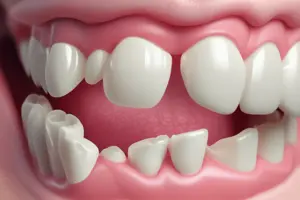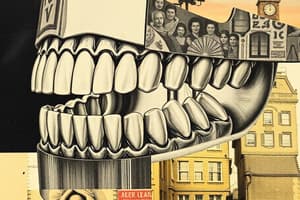Podcast
Questions and Answers
What is one way to help an anxious patient during dental procedures?
What is one way to help an anxious patient during dental procedures?
- Reassure and encourage relaxation. (correct)
- Encourage them to discuss their fears loudly.
- Move quickly to minimize their time in the chair.
- Tell them to breathe deeply through their mouth.
Which position should the dental chair be adjusted to for patient comfort?
Which position should the dental chair be adjusted to for patient comfort?
- Laid flat position.
- Reclined position.
- Upright position. (correct)
- Semi-reclined position.
Why is nasal breathing encouraged during dental procedures?
Why is nasal breathing encouraged during dental procedures?
- It reduces the likelihood of retching. (correct)
- It increases saliva production.
- It helps the dentist hear the patient's concerns.
- It allows the patient to talk comfortably.
What type of impression tray is generally more comfortable for patients?
What type of impression tray is generally more comfortable for patients?
When should the lower dental impression be taken?
When should the lower dental impression be taken?
What should the dentist do with the impression material before trying it in?
What should the dentist do with the impression material before trying it in?
What should be done if there are copious amounts of saliva in the mouth during the procedure?
What should be done if there are copious amounts of saliva in the mouth during the procedure?
What type of movements should be used when trying trays in the mouth?
What type of movements should be used when trying trays in the mouth?
What is a key factor in managing a patient's apprehension during dental procedures?
What is a key factor in managing a patient's apprehension during dental procedures?
Which factor is considered a psychogenic cause of dental retching?
Which factor is considered a psychogenic cause of dental retching?
What may contribute to retching in patients with persistent catarrh?
What may contribute to retching in patients with persistent catarrh?
What should a dentist do when assessing a patient experiencing retching?
What should a dentist do when assessing a patient experiencing retching?
What type of factors may cause dental retching unrelated to dental treatment?
What type of factors may cause dental retching unrelated to dental treatment?
How can retching during impression taking be minimized?
How can retching during impression taking be minimized?
What is often the best initial approach for correcting issues with denture wear?
What is often the best initial approach for correcting issues with denture wear?
Overcoming retching in dental settings primarily requires understanding which aspect?
Overcoming retching in dental settings primarily requires understanding which aspect?
What anatomical factor may require a deep notch in the flange of a denture?
What anatomical factor may require a deep notch in the flange of a denture?
Which factor can contribute to high occlusal loads in patients?
Which factor can contribute to high occlusal loads in patients?
What is a common cause of weak bonding between teeth and denture bases?
What is a common cause of weak bonding between teeth and denture bases?
What recommendation is widely supported for minimizing the risk of debonding?
What recommendation is widely supported for minimizing the risk of debonding?
What can help increase the bond strength between the denture base resin and the artificial teeth?
What can help increase the bond strength between the denture base resin and the artificial teeth?
What type of teeth generally achieves higher bond strength with denture bases?
What type of teeth generally achieves higher bond strength with denture bases?
Which substance is recommended for application on the ridge-lap surface to enhance bonding?
Which substance is recommended for application on the ridge-lap surface to enhance bonding?
What is a potential issue when drilling channels into the ridge-lap surface of teeth?
What is a potential issue when drilling channels into the ridge-lap surface of teeth?
What consequence may arise from excessive palatal thickening in the canine region?
What consequence may arise from excessive palatal thickening in the canine region?
Which sounds require contact between the lower lip and the incisal edges of the upper anterior teeth?
Which sounds require contact between the lower lip and the incisal edges of the upper anterior teeth?
What is necessary to produce the English consonants with the lateral margins of the tongue?
What is necessary to produce the English consonants with the lateral margins of the tongue?
What condition may arise if the posterior contact surfaces are positioned too far from the resting position of the tongue?
What condition may arise if the posterior contact surfaces are positioned too far from the resting position of the tongue?
During which sounds does the mandible move closest to the maxilla?
During which sounds does the mandible move closest to the maxilla?
What might occur if the occlusal vertical dimension of dentures is too great?
What might occur if the occlusal vertical dimension of dentures is too great?
What may be a direct result of the posterior teeth being too far buccally positioned?
What may be a direct result of the posterior teeth being too far buccally positioned?
Which sounds do not require the lateral margin of the tongue to contact the posterior teeth?
Which sounds do not require the lateral margin of the tongue to contact the posterior teeth?
What is a recommended way to distract a patient during the insertion of an impression?
What is a recommended way to distract a patient during the insertion of an impression?
Which method is NOT mentioned as a management approach for patients with a severe gagging reflex?
Which method is NOT mentioned as a management approach for patients with a severe gagging reflex?
What is a potential benefit of hypnosis for patients who have a strong gag reflex?
What is a potential benefit of hypnosis for patients who have a strong gag reflex?
How does acupuncture help with the gag reflex according to the strategies outlined?
How does acupuncture help with the gag reflex according to the strategies outlined?
What is the purpose of using a training denture in patients with a history of denture intolerance?
What is the purpose of using a training denture in patients with a history of denture intolerance?
Which technique relies on the patient's ability to practice self-management?
Which technique relies on the patient's ability to practice self-management?
What should a dentist reinforce during the setting period of an impression?
What should a dentist reinforce during the setting period of an impression?
Which situation presents the first major challenge in denture construction for patients with a severe gag reflex?
Which situation presents the first major challenge in denture construction for patients with a severe gag reflex?
Study Notes
Patient Factors in Denture Construction
- Anatomical issues, such as a prominent labial frenum, necessitate a deep notch in the flange that can create stress concentrations.
- High occlusal loads arise from strong masticatory muscles, remaining natural teeth, or bruxism, which can compromise denture stability.
Debonding of Teeth
- Weak bonds between tooth and denture base can result from:
- Residual tin-foil substitute on the ridge-lap surface.
- Residual wax on tooth surfaces.
- Incompatibility of cross-linked teeth with denture base polymers.
- Recommendations to minimize debonding risk include:
- Selection of compatible artificial teeth and denture base polymers, favoring conventional denture teeth for higher bond strength.
- Complete removal of wax and tin-foil substitutes; using a wax solvent is suggested for optimal results.
- Drilling small channels in the palatal tooth surface to enhance bonding area, though care is required to avoid trapping wax.
- Application of solvents like dichloromethane for improved adhesion.
Psychogenic Factors
- Psychological causes of retching can stem from sensory triggers associated with dental procedures, apprehensions from prior bad experiences, or distressing stories from others.
- Rarely, retching may indicate a psychological disturbance unrelated to dental treatment.
Systemic Factors
- Systemic diseases, particularly gastrointestinal issues, can contribute to symptoms like retching.
- Persistent catarrh may lead to difficulty in nose breathing, exacerbating retching issues.
Patient Management
- Severity assessment involves a detailed history to pinpoint causes; issues tolerated during denture construction but not during wearing might suggest design errors.
- Impression-taking techniques to prevent retching:
- Reassurance and a calm chairside manner are essential to ease patient anxiety.
- Patients should be seated comfortably upright.
- Instructing nasal breathing during procedures helps maintain a stable soft palate and tongue position.
- Use well-fitting, close-fitting special trays instead of bulky ones; lower impressions may provide patient success and confidence.
- Keep impression material preparation out of patient's sight and minimize quantity.
Distraction Techniques
- Engaging patients in conversation about their interests or techniques like focusing on breathing can divert attention from anxiety during procedures.
Management of Severe Gag Reflex
- Techniques for handling gag reflex challenges include:
- Conscious sedation to alleviate anxiety.
- Acupuncture may help control the gag reflex during procedures.
- Hypnosis can be beneficial if patients are motivated and able to practice self-hypnosis.
- Training dentures may assist patients with historical difficulties related to denture intolerance.
Impact on Speech and Denture Design
- Lower lip contact with upper anterior teeth affects sounds /f/ and /v/ when teeth positions differ from previous dentures, potentially disrupting speech.
- The lateral margins of the tongue must contact posterior teeth for producing English consonants; poor placement may restrict tongue movement and impair speech.
- Proper mandible-maxilla relationships are crucial; excessive occlusal vertical dimension can lead to tooth clattering during specific speech sounds.
Studying That Suits You
Use AI to generate personalized quizzes and flashcards to suit your learning preferences.
Related Documents
Description
Explore the critical patient factors influencing denture design in this quiz. From anatomical aspects like the labial frenum to occlusal load considerations in patients, understand how these factors affect the bond between tooth and denture base. Ideal for dental students and practitioners alike.




